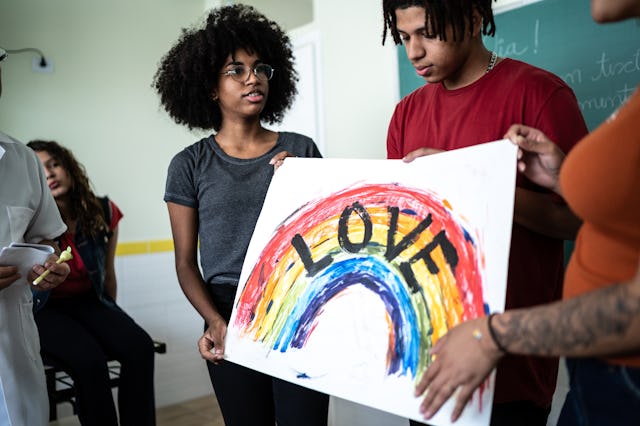Anti-LGBTQ+ School Policies Have Negative Mental Health Impacts On Students
A new report from the Trevor Project highlights the real-life harms of anti-queer ideology in schools.

For a lot of kids, back-to-school season is a time of dread, and not just because of homework or quizzes or algebra.
A recent study from the Trevor Project — Anti-LGBTQ+ School Policies and LGBTQ+ Young People — has found that increasingly common anti-LGBTQ+ policies at schools are hurting queer students’ mental health.
The Trevor Project, a non-profit focused on suicide prevention efforts among lesbian, gay, bisexual, transgender, queer, and questioning youth, surveyed 18,000 LGBTQ+ youth between the ages of 13 and 24. Of the 78% enrolled in school, nearly a third (29%) reported attending a school with at least one anti-LGBTQ+ policy.
Examples of these policies include (but are not limited to) being prevented from using a chosen name and pronouns, being disciplined for public affection that is not disciplined among non-LGBTQ+ students, being prevented from using the locker room that aligns with their gender, and/or being prevented from discussing or writing about LGBTQ+ topics in extracurricular activities.
Students in middle and high school age brackets were more likely to attend such an institution than their older peers (43% compared to just 16% of those between the ages of 18 and 24).
And it would seem that those policies, perhaps unsurprisingly, have a measurable effect on young people. LGBTQ+ youth at schools with a high number of anti-LGBTQ+ policies reported higher rates of seriously considering suicide in the past year compared to their LGBTQ+ peers at schools with fewer. Students at schools with no anti-LGBTQ+ policies reported even less suicidal ideation. Similar trends were reported regarding students experiencing anxiety, depression, and suicide attempts: the more anti-LGBTQ+ policies present at school, the worse LGBTQ+ students fared.
Negative outcomes were not just a matter of personal mental health, either. The presence of even one (or more) anti-LGBTQ+ school policy also correlated to reported higher rates of several types of anti-LGBTQ+ experiences in school, such as verbal harassment, being physically attacked because people thought they were LGBTQ+, experiencing unwanted sexual contact because people thought they were LGBTQ+, being disciplined for fighting back against bullies, and leaving school due to anti-LGBTQ+ mistreatment.
It’s a problem, it seems, that is only getting worse.
The American Civil Liberties Union (ACLU) is currently tracking 527 anti-LGBTQ+ bills throughout the United States. Only nine states have not introduced such legislation in 2024. A plurality of those that have been introduced pertain to schools and education in some capacity.
Similarly, Trans Legislation Tracker, an independent research organization tracking bills that impact trans and gender-diverse people across the United States, highlights how anti-trans legislation has steadily risen since 2015.
Not only is 2024 the most prolific year for legislation to date, but out of 642 bills they’re tracking nationwide so far, 196 pertain to education, a plurality of the total. While not all of those bills have made it past an introductory stage, and many have already been defeated, the marked increase year over year signals that these attacks on LGBTQ+ youth are an issue that must continue to be reckoned with.
The report highlights that, as of July 2024, seven states have laws censoring discussions of LGBTQ+ people or issues throughout all school curricula while six states require advanced notice and parental permission to discuss such matters, and four states have laws that restrict how “homosexuality” is discussed. Half of all states have no policies protecting LGBTQ+ students from bullying and two even have laws that would outlaw any efforts to extend such protections to queer kids.
And yet this report is just the latest in a long line of research and significant anecdotal evidence that highlights that such protections — and a cessation of hostilities — make a measurable difference in the lives of young people.
Until legislative bodies can effect positive social change, however, the Trevor Project offers resources for educators and administration to make schools a more affirming, less hostile place for LGBTQ+ young people, including the Is Your School LGBTQ-Affirming? checklist, the Creating Safer Spaces in Schools for LGBTQ Young People guide, and guides on allyship for gender non-conforming and bisexual youth and suicide prevention.